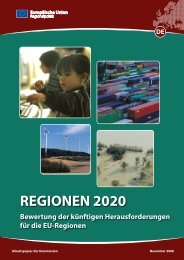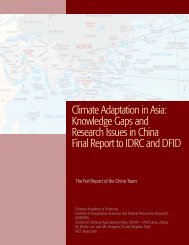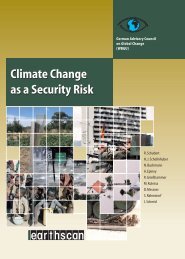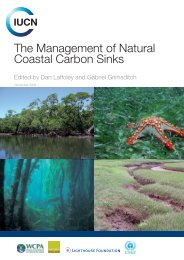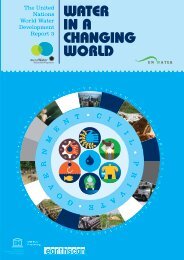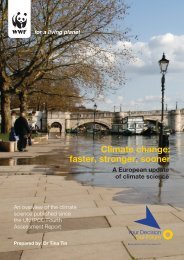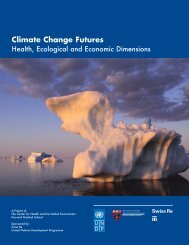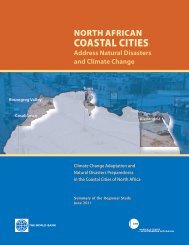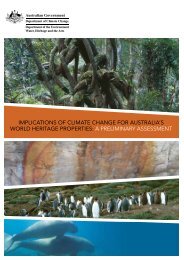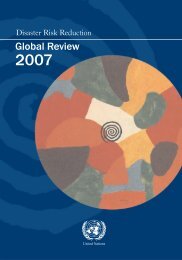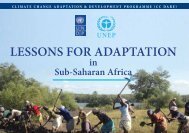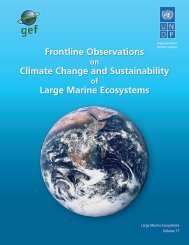Climate Change in Latin America - European Commission
Climate Change in Latin America - European Commission
Climate Change in Latin America - European Commission
You also want an ePaper? Increase the reach of your titles
YUMPU automatically turns print PDFs into web optimized ePapers that Google loves.
Annex 1 Questionnaire on <strong>Climate</strong> <strong>Change</strong><br />
1. EUrocLIMA Questionnaire<br />
This <strong>in</strong>formation has been compiled on the basis of questionnaires sent to all Lat<strong>in</strong> <strong>America</strong>n countries.<br />
INDEX<br />
1. Analysis of the problems<br />
National contributions to the causes of <strong>Climate</strong> <strong>Change</strong><br />
Known effects of <strong>Climate</strong> <strong>Change</strong> at a national and regional level<br />
Vulnerabilities<br />
High priority issues at a national level<br />
Conclusions<br />
High priority issues at a regional level<br />
2. Institutional context<br />
Relevant m<strong>in</strong>istry<br />
Relevant departments, composition and human resources<br />
Coord<strong>in</strong>ation between <strong>in</strong>stitutions<br />
Institutional organisations<br />
International commitments regard<strong>in</strong>g <strong>Climate</strong> <strong>Change</strong> and the environment<br />
Legislation of the sector<br />
Legal <strong>in</strong>struments to control/counteract environmental degradation<br />
Tak<strong>in</strong>g ownership of <strong>Climate</strong> <strong>Change</strong> issues<br />
Conclusions<br />
Current capacities and future perspectives<br />
Institutional problems<br />
3. Regional/National strategies and policies for the sector<br />
Evaluation of national development strategies undertaken, and <strong>in</strong>sertion of the issue of <strong>Climate</strong> <strong>Change</strong><br />
Evaluation of national environmental strategies undertaken, and <strong>in</strong>sertion of the issue of <strong>Climate</strong> <strong>Change</strong><br />
Evaluation of regional development strategies undertaken, and <strong>in</strong>sertion of the issue of <strong>Climate</strong> <strong>Change</strong><br />
Evaluation of regional environmental strategies undertaken, and <strong>in</strong>sertion of the issue of <strong>Climate</strong> <strong>Change</strong><br />
Evaluation of national and regional studies about <strong>Climate</strong> <strong>Change</strong> and the Environment<br />
Additional studies<br />
Conclusions<br />
Environmental monitor<strong>in</strong>g system<br />
Interrelation of strategies for <strong>Climate</strong> <strong>Change</strong> and susta<strong>in</strong>able development<br />
4. Actors<br />
Who are the <strong>in</strong>terested parties at a national level Public organisations, civil society, the private sector,<br />
scientific <strong>in</strong>stitutions/universities, conservation/environmental funds<br />
Who are the regional/<strong>in</strong>ternational <strong>in</strong>terested parties International organisations and agencies<br />
How can these actors be coord<strong>in</strong>ated<br />
Conclusions<br />
Which organisation should have its role accentuated<br />
Problems identified: coord<strong>in</strong>ation, synergies, lack of data<br />
5. National/regional actions<br />
Activities f<strong>in</strong>anced by the <strong>European</strong> <strong>Commission</strong> (s<strong>in</strong>ce 2002)<br />
Activities f<strong>in</strong>anced by member states (s<strong>in</strong>ce 2002)<br />
Activities f<strong>in</strong>anced by other <strong>in</strong>ternational agencies/organisations(s<strong>in</strong>ce 2002)<br />
What possibilities for coord<strong>in</strong>ation/synergy exist<br />
Conclusions<br />
What types of programme/project can be f<strong>in</strong>anced<br />
47



